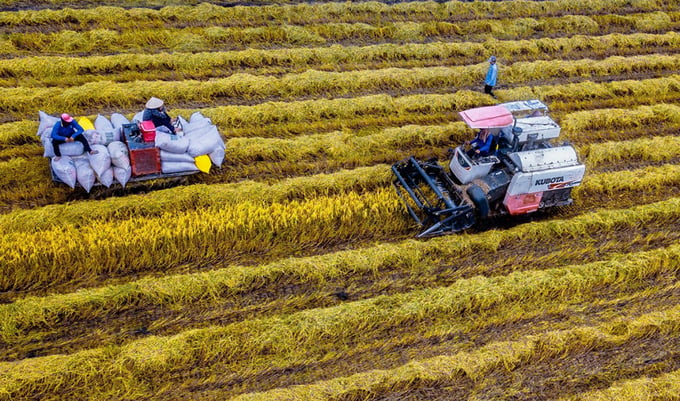November 27, 2025 | 19:15 GMT +7
November 27, 2025 | 19:15 GMT +7
Hotline: 0913.378.918
November 27, 2025 | 19:15 GMT +7
Hotline: 0913.378.918

Harvesting rice crop in Hau Giang province. Photo: An Binh
This content was just raised by the Agricultural Project Management Board when working with the Ministry of Agriculture and Rural Development in Can Tho on April 8.
The Ministry evaluates the sustainable development project of one million hectares specializing in high-quality rice cultivation as essential and urgent, requiring a specific mechanism. Therefore, this agency plans to request the Government to allow the construction of a project to borrow money from the World Bank according to a particular mechanism. The central budget allocates 100% of ODA capital (an on-lending mechanism is not applied).
The total project investment is expected to be more than USD 470 million (equivalent to nearly VND 11,800 billion). Of which, the World Bank loan is about USD 360 million (equivalent to VND 9,000 billion); Domestic counterpart capital is more than USD 112 million. With nearly 1 million hectares of rice, each investment ranges from USD 325 to USD 794 per hectare.
Senior Agriculture Economist in the South Asia Region of the World Bank Li Guo said he would submit the project to leaders based on the sustainable agricultural transformation project in Vietnam (VnSAT), but more expanded.
"We hope that Vietnam will be a pioneer in reducing emissions in agricultural production worldwide. We will coordinate closely with the Ministry to take the next steps," said the World Bank's Economist.
Project for Sustainable Development of one million hectares specializing in high-quality and low-emission rice cultivation associated with green growth in the Mekong Delta until 2030, approved by the Prime Minister at the end of 2023. The project aims for the sustainability of Vietnam's rice industry and farmers' income, adapt to climate change, reduce greenhouse emissions, and contribute to implementing international commitments.
By 2025, 12 provinces and cities in the Mekong Delta will grow 180,000 hectares of low-emission rice and pilot carbon credits for areas that meet standards. By 2030, the region will expand to 820,000 hectares of low-carbon rice...
Currently, each year, the provinces in the West produce 24-25 million tons of rice, accounting for more than 50% of rice output and over 90% of the country's rice exports.
Translated by Huong Giang
/2025/11/27/3830-1-152901_403.jpg)
(VAN) Dong Nai is developing its key crop areas, expanding planting area codes, and applying high technology to increase the value of agricultural products, aiming at a green and sustainable agriculture.

(VAN) Tay Ninh’s livestock sector is undergoing a major transformation, applying high-tech, closed-loop circular models to build sustainable value chains.
/2025/11/26/3627-4-082628_818.jpg)
(VAN) From a small café on the red basalt highlands, Le Van Hoang started a business with clean coffee, building Enjoi Coffee into a symbol of organic agriculture in the Lam Dong plateau.
/2025/11/25/0045-1-135246_13.jpg)
(VAN) Ca Mau is researching a model of sea-encroaching embankments combined with viaducts and logistics service zones, aiming both to prevent erosion and create land funds for marine economic development.

(VAN) The information was shared at the seminar 'Urban Agriculture - Solutions for Developing Green Spaces,' organized by the Kinh te & Do thi Newspaper and the Biotechnology Center of Ho Chi Minh City.
/2025/11/19/4141-2-132831_216.jpg)
(VAN) One of Japfa's outstanding solutions is implementing digital transformation and artificial intelligence (AI) to optimize operations, enhance productivity, and advance sustainable development.
/2025/11/19/4847-1-093540_448.jpg)
(VAN) The Gia Lai Provincial People’s Committee had a working session with the delegation of the U.S. Department of Agriculture, the State of Idaho, and representatives of the State's leading enterprises.